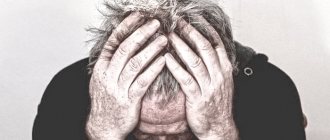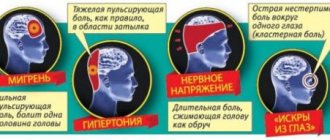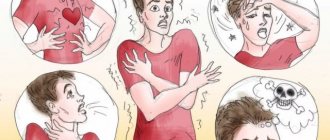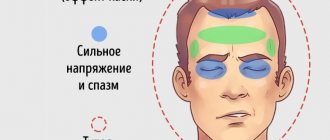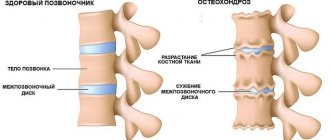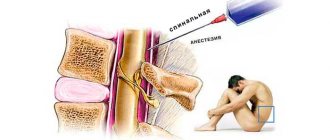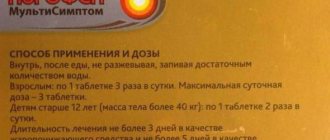Headache (cephalgia) is one of the most common complaints when visiting a doctor. This is a nonspecific symptom that accompanies many diseases (from chronic fatigue and colds to tumors). To find out the cause of an unpleasant symptom, a comprehensive survey and examination of the patient is required.
Most people with high blood pressure (BP) regularly suffer from headaches. Chronic cephalgia is sometimes the first and only sign of hypertension.
There are approximately 300 types of drugs on the Russian pharmaceutical market that are positioned as relieving headaches.
Why does my head hurt when my blood pressure rises?
Arterial hypertension (AH) is a stable and prolonged rise in pressure (> 135/85 mm Hg), which occurs against the background of increased peripheral vascular resistance.
In 90% of cases, hypertension has no clear cause (essential or primary hypertension); in the remaining 10%, the increase in blood pressure is caused by renal, endocrine and other pathologies (symptomatic or secondary).
In the list of the international classification of headaches, cephalalgia in arterial hypertension is classified as class 10 (associated with disturbances of homeostasis). That is, this symptom is secondary to the underlying disease. Proper treatment of the causative factor reduces the frequency and intensity of pain.
The mechanism of headaches in patients with hypertension depends on many reasons, so there are several types of cephalalgia:
- Caused by an increase in intracranial pressure due to obstructed outflow of blood through the veins (liquorodynamic) . Occurs when there is insufficient resistance of the vascular wall. High pressure expands the lumen of the vessel, and the blood “stagnates” in the venous bed.
- Vascular (impaired tone of intracranial arterioles). If headache is caused by vasodilation, then its strength will decrease while simultaneously pressing the jugular veins. In case of vasospasm, the pain will decrease with bilateral pressure on the carotid arteries.
- Associated with cerebral ischemia (hypoxic) . Prolonged spasm of the intracranial arterioles impedes the delivery of oxygen to the tissues, and perivascular edema develops.
- Muscular . Excessive tension in the scalp muscles due to emotional or physical stress. Patients with neurasthenic and depressive tendencies, osteochondrosis, poor posture, and reduced visual acuity are prone to this type of pain.
It is worth remembering: a headache does not in all cases equal an increase in blood pressure!
With a long course of the disease in hypertensive patients, it is impossible to establish a clear connection between the increase in pressure and the development of cephalgia. Over time, a certain adaptation of the vascular wall to the increased blood flow occurs, and pain sensations become dull or disappear altogether. In such patients, only an increase in the numbers on the tonometer by more than 25% of the “working” values provokes an attack of cephalgia.
It should also be taken into account that headaches of other origins themselves indirectly increase blood pressure.
Factors that provoke the appearance of headaches:
- emotional shock;
- hard physical labor;
- weather changes;
- alcohol abuse;
- large doses of caffeine;
- some medications (“Nitroglycerin”, “Rinatidine”, calcium channel antagonists, “Dipyridamole”, “Indomethacin”, “Acetylsalicylic acid”, “Eufillin”, oral contraceptives, etc.).
The cause-and-effect relationship between cephalgia and high blood pressure can be traced only in the following cases:
- An increase in diastolic (lower) blood pressure > 25% of the average values for the patient. Such an attack passes within 24 hours after the pressure decreases.
- If diastolic blood pressure > 120 mm Hg. Art. Then cephalalgia appears in the morning, after sleep, and has a pressing, bursting character. Predominant localization: back of the head, temporal region. Additionally, there is nausea and rarely vomiting.
- Hypertension that develops during an attack of hypertensive encephalopathy (an emergency condition accompanied by a rise in diastolic blood pressure > 130 mm Hg, papilledema, confusion, and can result in a hemorrhagic stroke).
- If hypertension develops during eclampsia (a life-threatening condition in pregnant women with increased blood pressure, generalized edema, protein in the urine, convulsions). After normalization of blood pressure or childbirth, cephalgia disappears.
The nature of headaches depending on the mechanism of occurrence:
- Liquorodynamic. A feeling of fullness in the back of the head, sometimes with pulsation. Intensifies in the morning, in a lying position, tilting the head. Additionally, nausea, weakness, blurred vision, and swelling of the eyelids may occur.
- Vascular. Rhythmic throbbing pain (“blows to the back of the head and temples”), intensifies when walking, turning the head, coughing. Sometimes accompanied by noise in the head, stuffy ears, flashes before the eyes.
- Ischemic. Dull, aching pain in the temporo-occipital region, accompanied by dizziness, nausea, stars before the eyes, decreased attention and memory.
- Muscular. Sensation of compression from the back of the head to the forehead (hoop, helmet). Occurs after emotional stress, the intensity has a wave-like character.
Arterial hypertension is the main cause of the development of cerebrovascular diseases (transient ischemic attack, stroke), intracranial hemorrhages and subarachnoid hematomas. Therefore, you need to be especially careful about cephalgia in hypertension.
Headache in a patient with hypertension is sometimes caused by other causes that increase blood pressure:
- migraine;
- tension headache;
- intracranial hemorrhage;
- brain tumors;
- pheochromacytoma;
- intracranial aneurysm;
- glaucoma.
Tension headaches are often present in patients with mildly elevated blood pressure. They are characterized by:
- provoking factors in the form of emotional and mental stress;
- mild to moderate pain;
- compressive nature of pain;
- no nausea, dizziness, visual disturbances;
- the attack goes away within one to two hours after taking regular NSAIDs or on its own.
Headache with low blood pressure
If the above steps do not help, then you will have to pick up some pills for headaches with high blood pressure. You should not experiment with your own body, but it is better to leave the selection of medications to a specialist. He will prescribe medications that affect the disease itself, i.e., high blood pressure. Among these medications are:
- ACE inhibitors. Drugs in this group help dilate the arteries and remove fluid, which lowers blood pressure.
- Beta blockers. Such medications affect adrenaline, neutralizing its effect on the receptors of brain vessels, as a result of which blood pressure normalizes and the headache stops.
- Diuretics. Their action is based on the excretion of sodium along with urine. This leads to a decrease in blood flow and a decrease in pressure.
ACE inhibitors
The use of ACE inhibitors has been going on for more than 10 years. They are indicated for patients with hypertension accompanied by diseases such as heart failure and cardiac ischemia, chronic lung diseases and diabetes mellitus. The effect of these drugs is to narrow blood vessels. Among the medications in this group are:
- Perindopril;
- Captopril;
- Enalapril;
- Ramipril;
- Kozaar;
- Benazepril;
- Losartan;
- Veroshpiron.
The following tablets for headaches and high blood pressure are beta blockers. They reduce the heart rate. This also leads to a decrease in the volume of blood that flows into large arteries. Drugs of this type are combined with almost all other medications. They are indicated for patients with hypertension who also have tachycardia, cardiac ischemia or arrhythmia. The list of beta blockers includes the following medications:
- Anaprilin;
- Egilok Retard;
- Anaprilin;
- Levatol;
- Nebivolol.
When it comes to what to take for high blood pressure, diuretics play an important role. These drugs have a diuretic effect. Along with urine, sodium ions and water are removed from the human body. Removing excess fluid allows you to reduce the volume of blood flow in the vessels. As a result, hypertension recedes. As for the drugs themselves from the group of diuretics, the following tablets stand out:
- Furosemide;
- Indapamide;
- Polythiazide;
- Klopamide;
- Lasix;
- Indapaphone;
- Hypothiazide;
- Uregit;
- Trifas.
Each person has their own threshold for relatively low blood pressure. Young people are characterized by physiological hypotension and feel great with tonometer readings of 90/60 mmHg. Art.. Elderly people who have been suffering from hypertension for a long time feel discomfort even when the levels drop below 12080 mmHg. Art.
With hypotension, the brain does not receive enough blood, oxygen and nutrients, which explains the headache in such cases.
List of drugs to relieve the condition
The effectiveness of eliminating headaches depends on determining the mechanism of development of the symptom and targeting it with a suitable medication.
The most common tablets for relieving cephalalgia are various non-steroidal anti-inflammatory drugs (NSAIDs). Medicines in this group have a similar mechanism of action and effects: analgesic, antispasmodic and antipyretic. But each medication affects the body to varying degrees. Elimination of pain after taking NSAIDs usually occurs within 0.5-2 hours due to a decrease in the production of inflammatory agents, tissue swelling and inhibition of the transmission of pain impulses to the cerebral cortex.
Uncontrolled use of NSAIDs leads to a number of complications:
- allergic reactions;
- bronchospasm in patients sensitive to Aspirin;
- ulcerative lesions of the gastrointestinal tract;
- decreased liver and kidney function;
- abuse headache (in case of abrupt withdrawal after long-term use of high doses of medication).
Beta blockers have also proven effective in the treatment and prevention of headaches associated with high diastolic blood pressure. These drugs are used for coronary heart disease, angina and hypertension. By normalizing vascular tone and reducing pressure, medications additionally help with cephalalgia in patients with hypertension and migraine.
Beta blockers should not be taken without consulting a doctor, as they have a number of contraindications:
- bronchial asthma, obstructive pulmonary diseases;
- violation of intracardiac conduction;
- uncontrolled diabetes mellitus;
- peripheral vascular diseases with trophic changes in the skin.
As an additional treatment for headaches associated with impaired venous return from the cranial cavity, the doctor sometimes adds diuretics (Furosemide, Veroshpiron or Diacarb).
Vascular headaches with high blood pressure can be relieved by combination medications with antispasmodics.
Medications for headaches with high blood pressure:
How to relieve a headache
If you have hypertension, you need to be able to relieve pain that is felt in different parts of the head. Thanks to this, the patient learns to alleviate his condition. Traditional pharmaceutical drugs prescribed by doctors help relieve headaches. Also in such a situation, some folk remedies that eliminate obvious signs of hypertension are useful.
Hypertension does not tolerate self-medication. With such a disease, consultation with an experienced specialist is required. It is he who decides which remedy to use for a particular patient for headaches and other symptoms of high blood pressure.
Antihypertensive medications help relieve headaches that are a consequence of high blood pressure. Antispasmodics and painkillers also cope with this task. A smooth decrease in blood pressure values allows you to get rid of obvious signs of hypertension without any problems.
If a person has a headache or a headache, he can treat this symptom in a non-drug way. The discomfort caused by hypertension will go away if you take the following useful measures:
- A daytime nap or a short rest during a break at work helps to ease the patient’s general well-being;
- Warm drinks without added caffeine help eliminate the nausea that accompanies headaches;
- To make nausea go away faster, it is recommended to stop drinking large amounts of water.
Until the hypertensive patient gets better, it is best for him to have access to fresh air. To do this, it will be enough to ventilate the room in which it is located well.
If circumstances permit, you need to lie down and try to sleep
Medicines
Tablets for headaches due to hypertension help to cope with discomfort. They come in different types, which differ from each other in their principle of action and composition. All the main medications that can normalize blood pressure and at the same time eliminate the obvious symptoms of hypertension are presented in the table.
| Group of drugs | Characteristic |
| Antispasmodics | Since headaches in most cases are caused by vasospasm, these drugs help to cope with the discomfort. They prevent changes in tone, which leads to the occurrence of atherosclerotic lesions and disruption of the functioning of the nervous system. The most effective antispasmodics are: 1. "Papaverine"; 2. "Dibazol"; 3. "No-Shpa"; 4. "Tempalgin". It is recommended to trust the choice of a suitable antispasmodic to a competent specialist who monitors the course of hypertension in the patient. |
| Beta blockers | Medications that help neutralize the effect of adrenaline on receptors located in the area of the blood vessels of the brain. Due to this, blood pressure values decrease, as well as the main symptoms of the pathological process are eliminated. The most effective beta blockers in the fight against headaches due to hypertension include: 1. "Anaprilin"; 2. "Timolol"; 3. "Kordan"; 4. "Concor". Beta blockers have a long-lasting effect. In addition, they can be combined with many other groups of antihypertensive drugs. |
| Tranquilizers | Patients with hypertension can supplement their course of drug treatment with drugs that belong to the group of tranquilizers. The following medicine can help them with headaches: 1. "Valium"; 2. "Xanax"; 3. "Phenazipam". Drugs of this type are famous for their high efficiency and minimal number of negative reactions from the body to their use. If you take tranquilizers in limited quantities, you can significantly improve your quality of life, which worsens due to high blood pressure. |
| Antidepressants | Due to the fact that a person experiences stress, his body produces adrenaline. Against this background, vascular disorders may develop, which cause increased blood pressure. Antidepressants suppress such conditions and relieve pain. Constant headaches are typical precisely for those hypertensive patients who are constantly under stress. In this case, these drugs not only calm the person, but also increase the effect of analgesics. The most common antidepressants recommended for headaches are: 1. "Clomipramine"; 2. “Imipravmin”; 3. "Amitriptyline"; 4. "Minseran"; 5. "Nefazadone". Antidepressants are widely used by patients with hypertension and persistent complaints of headaches. |
| NSAIDs | In case of hypertension, which is accompanied by headache, painkillers do not always give the desired result. In some cases, doctors recommend that patients take non-steroidal anti-inflammatory drugs, such as: 1. "Ibuprofen"; 2. “Paracetamol”; 3. "Analgin". They do not help suppress the disease, but only temporarily eliminate one of its symptoms - headaches. |
| Combined products | Combination drugs contain several active substances that work effectively with each other. For headaches suffered by hypertensive patients, it is recommended to take: 1. "Afelfan"; 2. "Brinerdin"; 3. "Albarel"; 4. "Rilmetidine". These medications can replace a bunch of medications that belong to different groups, while still giving the same treatment results as them. |
Typically, hypertension requires taking several medications at once, which belong to different groups. Only comprehensive treatment helps suppress attacks of the pathological process and eliminate obvious signs of illness, including headaches.
conclusions
Headaches are not always directly related to high blood pressure! The causes of cephalalgia are varied.
Hypertensive patients with frequent attacks of cephalalgia, poorly controlled by conventional analgesics, should be comprehensively examined to determine the cause and select adequate treatment.
Before using any medications, people with hypertension should consult a specialist. The doctor will select the most suitable tablets for headaches that do not increase blood pressure, which will be compatible with medications to treat the underlying disease.
The following sources of information were used to prepare the material.
We live in very stressful times. Even young people are under great psychological pressure. They have no confidence in anything. Not in work, not in relationships, not in life. There is no time for rest, hobbies, or regular meals. People try to compensate for stress by smoking, alcohol, and drugs, thereby ending up in a vicious circle. As a result of an unhealthy lifestyle, diseases arise, including hypertension. Headache with high blood pressure is one of the first signs warning of problems in the body.
Antidepressants for hypertension pain
Stress causes high levels of adrenaline in the blood, vascular disorders occur, and headaches occur due to high blood pressure. Thanks to antidepressants, you can remove painful symptoms by eliminating cause and effect at the same time. Feeling dizzy and in pain can cause depression. In this case, a person falls into a trap when depression causes high blood pressure and dizziness, and against their background, depression worsens.
What to do to break this circle? Take antidepressants and headache medications as prescribed by your doctor. Clomipramine, amitripyline, and mianserin are most often prescribed. They should be taken before bed, the effect lasts about 7 hours. Then the technique is repeated according to the scheme. For chronic headaches, nefazodone is prescribed to relieve anxiety. Some medications can cause vertigo (dizziness), apathy, and lethargy. It is impossible to say exactly which pills will cause such a reaction - each body reacts individually.
Often, doctors, having found out the causes of headaches, prescribe combination drugs. Thanks to them, the effectiveness of treatment can be enhanced. These medications are: adelfan, albarel, brinerdine.
Adelfan reduces high blood pressure, and with it eliminates pain. If you suffer from severe hypertension and a headache, Albarel will give the maximum effect - it acts within 24 hours.
Pressure surges in themselves are tiring, and if they also cause a headache, it becomes difficult for the patient to carry out usual activities. The doctor will find out what pressure is “working” for the patient, based on this, he will draw conclusions and make a decision on prescribing medications. Many painkillers can be used when blood pressure is high or low, as they do not affect blood pressure. But if pain, dizziness and pressure are interrelated, then just painkillers will not help.
Features of headaches in hypertension
High blood pressure headaches are accompanied by a number of other symptoms, including:
- fatigue, weakness;
- unpleasant sensation, pressure in the head;
- dizziness;
- imbalance;
- ringing, whistling, other sounds in the ears;
- visual impairment;
- blurred vision;
- redness or paleness of the face;
- sweating;
- nausea;
- sleep disorders;
- disturbances in concentration;
- nose bleed;
- chest pain;
- chest pressure;
- heartbeat.
Headache and blood pressure
Headache with high blood pressure spreads to certain areas. The pain can be pulsating or continuous, felt in the back of the head or temporal parts of the skull.
Headache may be combined with other symptoms:
- very sick;
- dizzy;
- flickering in the eyes;
- increased heart rate;
- pain in the heart area;
- Vomiting caused by stress may begin;
- noise in ears;
- redness and swelling of the face;
- tingling in the limbs.
The discomfort most often occurs in the morning, immediately after waking up, or at other times. A person does not know what to do, it is difficult to understand why such a phenomenon arose.
The listed symptoms, including headache, are characteristic of hypertension and require seeking medical help.
With high blood pressure, the discomfort is usually localized in the frontal region, at the temples, and in the back of the head. Pain can occur anywhere there is a vessel.
It is easier to cope with any pathology at the initial stage of development. This rule also applies to high blood pressure. Ignoring deviations of parameters from the norm can lead to unpredictable consequences.
The head doesn't hurt, but the readings are high
Increasing blood pressure parameters are not always accompanied by pain in the back of the head or temples. At the initial stage of development of hypertension, it is difficult to recognize the disease. And not all symptoms appear immediately.
A person does not know what to do when his blood pressure is high and his head hurts; medications do not help. Seeing a doctor often occurs at a more advanced stage, when the manifestations of hypertension become painful and prevent normal work and rest.
Migraine
If blood pressure increases, the back of the head and temples almost always suffer. The nature of the discomfort may vary. If the sensations bother you on one side, it’s a migraine.
The causes of migraine are:
- narrowing of blood vessels and arteries, which disrupts the blood supply to the vascular part of the brain;
- uneven expansion of blood vessels in the brain system;
- nervous tension;
- after alcohol;
- high physical activity;
- disturbances in the body due to sudden changes in weather.
Migraine is one of the main symptoms of high blood pressure. And the symptoms of migraine with high blood pressure are the following characteristics:
inability to concentrate; flickering before the eyes; nausea, often ending in vomiting; pale skin; redness of the eyes, accompanied by lacrimation; depression; photophobia.
Migraines can begin in the early morning, after waking up. The migraine increases gradually and becomes unbearable. Migraines can last a day or two days.
Headaches can be a concern not only because of elevated blood pressure parameters. A decrease in pressure also brings discomfort.
Next, we’ll figure out how a headache hurts if a person suffers from low blood pressure, and why this symptom is bothersome when the levels are normal.
Causes of cephalalgia with high blood pressure
Most often, high blood pressure does not hurt. Therefore, the disease is called the “silent killer.” Healthy vessels are elastic and therefore able to adapt to pressure surges. A person with hypertension can live for years without symptoms. But if the vessels stop adapting to the increase in blood pressure, they begin to “harden” - the muscles increase, the vessels narrow. These are the reasons why pressure headaches occur.
Important! If a person is obese, has high levels of lipids in the blood, smokes or drinks alcohol excessively, the blood vessels narrow much faster.
Pressure changes cause damage to blood vessels, which leads to damage to other organs, in particular the heart, eyes, kidneys, and brain. If a person does not receive treatment, he is at risk of developing symptoms of hypertension, including chest pain with increased physical activity, tinnitus, and dizziness. When the lower pressure or upper value is increased, headache also occurs. If symptoms occur, testing is recommended.
Classification
Pressure causes headaches for many reasons, but the pain is mainly due to the modern lifestyle. It is often associated, in particular, with high physical activity or psychological stress. These factors lead to increased tension in the muscles around the neck, which causes headaches.
Vascular
Among cerebral vascular diseases, headache always accompanies intracerebral and subarachnoid bleeding. These conditions appear suddenly and are accompanied by worsening symptoms, including headache and vomiting. Intracerebral bleeding is the most common consequence of vascular wall rupture in severe hypertension.
Liquor
Disturbances in liquorodynamic processes can cause headaches that radiate to the arms, dizziness, hearing loss, flickering before the eyes, and a tingling feeling in the arms, especially at night.
If these symptoms occur, but your head does not hurt, this does not mean that everything is in order! A doctor's consultation is required.
Ischemic
Symptoms of cerebral vascular disorder that last more than a day can result in the death of the patient. It is a neurological disorder whose incidence increases with age. Due to the increase in the average life expectancy of the population, the number of cases of ischemia has also increased.
The most common cause is an atherosclerotic plaque in the brain cavity, where a blood clot forms, vessel ruptures and subsequent ischemia occur. Other causes include disorders of the heart and circulatory system, such as heart rhythm disorders (atrial fibrillation, which can cause left ventricular embolism) and anemia (ischemia occurs due to insufficient oxygen supply to the brain).
Neuralgic
Neuralgic pain is caused by damage to the nerves - trigeminal, cerebral or others. In this case, pain medications are generally ineffective, and medications used to treat other types of diseases, such as epilepsy or mental disorders, are used.
Muscular
This group includes tension headaches caused by tension in the neck muscles, running from the cervical spine throughout the head and ending at the brow ridge and temples. A typical manifestation is dull pressure.
Medicines for cephalalgia with high blood pressure
If it is impossible to get rid of headaches with high blood pressure only through lifestyle changes, or routine measures help relieve pain only to a limited extent, pharmacological treatment is prescribed. After a thorough examination, an individual therapeutic plan is developed.
Important! Before using medications, you can try mudras for headaches and blood pressure. Finger mudra, recommended by experts, relaxes and has an analgesic effect.
Today, a wide range of effective medications for headaches and high blood pressure are available. These medications are divided into groups based on their effects:
- drugs that affect metabolism in the body;
- drugs that inhibit excessive activity of the sympathetic nervous system;
- medications that dilate blood vessels;
- substances that block the production of certain enzymes.
Tranquilizers for headaches
With elevated blood pressure, patients experience a number of unpleasant symptoms, including numbness of the limbs, tachycardia, pain in the back of the head and temples. If you don't take medication, symptoms worsen. Often, to relieve this condition, benzodiazepine tranquilizers are prescribed: phenazepam, Valium, Xanax. You can, of course, hope for a higher power, but it is more practical to take medication.
Tranquilizers relieve the following symptoms: dry mouth, excessive sweating, chills, headache and dizziness with high blood pressure. Phenazepam relieves anxiety and seizures, relaxes muscles, and calms nerves. Not everyone can take such pills - contraindications include the presence of glaucoma, myasthenia gravis, pregnancy, and respiratory failure. In old age, phenazepam is not prescribed.
Xanax based on alprazolam has a sedative effect, you need to start the course of treatment with small doses. To avoid withdrawal symptoms, take Xanax for up to 2 weeks.
Valium is prescribed when a condition such as high blood pressure causes headaches and dizziness to torment the patient. The drug gives a hypnotic effect, calms, lowers blood pressure and relieves pain. Sold by prescription. If older patients have headaches, they are prescribed 2 mg of Valium twice a day. For diseases of the nervous system, take the drug 5 mg 2-3 times a day, continue for 3 days, after which treatment with these tablets is completed. Contraindications for use include pregnancy and breastfeeding, alcohol or drug intoxication, and sensitivity to components.
What not to do with blood pressure and cephalalgia
With high blood pressure, it is important not only what to do to prevent and relieve headaches, but also what not to do.
First of all, it is advisable to quit smoking. Each puff increases the level of carbon monoxide in the blood, which in some cases can restrict blood flow to the brain. As a result, a headache occurs.
For regular attacks, it is recommended to limit the consumption of alcohol and coffee. Chewing gum is also taboo because chewing gum causes stiffness in the jaw muscles, which can lead to headaches.
A striking symptom that significantly worsens a person’s condition is headache with high blood pressure. Soreness torments the patient constantly, pulsates, squeezes, squeezes the head. Often the pain is localized in the occipital region of the skull and spreads to the frontal and temporal parts. To improve your well-being, you need to know which medications help and do not increase your already high blood pressure.
p, blockquote 2,0,0,0,0 –>
What is prohibited for high blood pressure and headaches
When a headache occurs, people often decide that the cause is blood pressure. And what happens to it: does it increase or decrease - this is a secondary question. They try to “help” themselves, try to take urgent measures on the advice of a neighbor or relatives
It is important to know what can be harmful with high blood pressure:
- a cup of strong coffee or tea;
- hot bath;
- alcohol: some try to “wash down” their pain syndrome;
- smoking: a person is nervous, worried, and in this state smokes;
- panic: thoughts that life is hanging by a thread, and death is very close.
While waiting for the emergency room, it is necessary to calm the patient down, give him a drink of water, and breathe fresh air. Regular headaches are clear signals about disorders in the body. You should not take painkillers on your own, which not only do not eliminate the cause, but also have negative side effects. An experienced doctor will select medications that effectively lower blood pressure and, accordingly, relieve pain.
Symptoms
p, blockquote 3,0,0,0,0 –>
Attacks of headaches (cephalalgia) with hypertension are divided into:
p, blockquote 4,0,0,0,0 –>
- Vascular , bursting, with pulsation in the temples and back of the head. When coughing and bending over, the pain increases many times over.
- Ischemia and neuralgia with acute shooting attacks radiating to adjacent areas of the skull.
- Liquorodynamics , increasing with physical stress. Expressed in dull pain, accompanied by darkening of the eyes, nausea, and weakness.
- Muscle pain that occurs after stress or overwork. They are accompanied by nausea, tinnitus, and dizziness.
When blood pressure rises, a person:
p, blockquote 5,0,0,0,0 –>
- My head is spinning.
- The body is chilling.
- The face turns red.
- Sweating increases.
- Hands get cold.
- Shortness of breath occurs.
- Swelling may occur.
What to do
p, blockquote 6,0,0,0,0 –>
If your health worsens due to surges in blood pressure, you need to:
p, blockquote 7,0,0,0,0 –>
- Ventilate the room or go out into the fresh air.
- Calm down, don't be nervous.
- Relax, lie down for half an hour.
- Make a warm foot bath.
- Brew motherwort, sage or valerian.
- Place a cool compress on your eyes.
When you need medical help
p, blockquote 8,0,0,0,0 –>
You need to go to the hospital if:
p, blockquote 9,0,1,0,0 –>
- Acute increasing pain that occurs for the first time.
- High body temperature, accompanied by severe headaches.
- Light and noise sensitivity, nausea, vomiting.
- Pain that occurs after a night's sleep.
- Recent neck or head injury.
- Pain syndrome with blurred consciousness and blurred vision.
- Pressure attacks in the face area, increasing with sudden bending.
What medications help
p, blockquote 10,0,0,0,0 –>
Depending on the reasons why blood pressure may increase, the doctor prescribes medications that relieve attacks of cephalgia. A number of such drugs are used:
p, blockquote 11,0,0,0,0 –>
- Antispasmodics.
- Tranquilizers.
- Anti-inflammatory non-steroidal drugs.
- Antidepressants.
- M-chonolytics.
- ACE inhibitors.
- Diuretics (diuretics).
It is important to know that you should not take the familiar Citramon for headaches if you have hypertension. This drug increases blood pressure due to its high caffeine content. It is perfect for hypotensive patients, but hypertensive patients need to be as careful as possible with it.
p, blockquote 12,0,0,0,0 –>
Antispasmodics
p, blockquote 13,0,0,0,0 –>
Vascular spasms lead to cephalgia. Their condition is negatively affected by atherosclerotic plaques and diseases of the nervous system. The doctor prescribes pills for spasms and headaches with high blood pressure, the list of which may include:
Hypertensive crisis
High blood pressure can cause many negative consequences. One of the most dangerous is a hypertensive crisis. It usually develops in patients with a long-term medical history. This occurs when treatment rules are violated, refusal to take medications, emotional shock, or exposure to unfavorable conditions. Vasospasm leads to a sharp rise in blood pressure to 200/110 mm. Hg Art. and higher, increased heart rate, development of ischemia of brain and heart tissue.
Clinical picture of hypertensive crisis:
- severe, excruciating, deafening pain in the head;
- weakness;
- nausea, vomiting;
- noise in ears;
- dizziness, loss of coordination;
- discomfort in the heart area;
- soreness in the eyes;
- lethargy turning into excitement;
- shortness of breath, tremor, cold sweat.
You should never tolerate a headache due to pressure - this can also cause a hypertensive crisis. Only a doctor can provide effective assistance to a patient in such a situation. Before his arrival, the patient must be placed in a semi-sitting position, blood pressure measured, and a sedative offered. If the pressure is very high, and Kopaten or Corinfar is available, you can put the medicine under the patient’s tongue. It is necessary to ensure that the victim does not close his eyes and drinks water if there is nausea.

